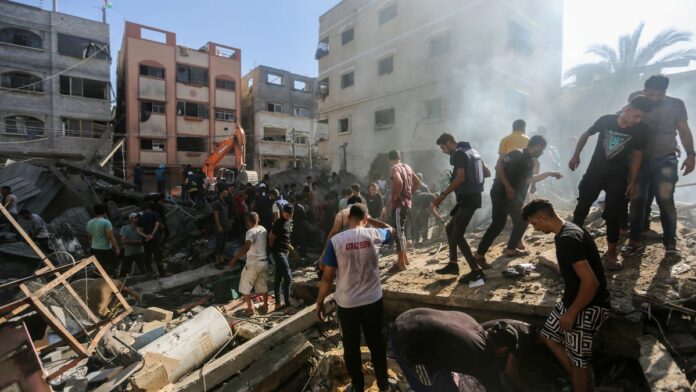Top U.S. diplomats continue to pressure Israel for a humanitarian pause or ceasefire in the month-long Gaza Strip operation to no avail, said a regional diplomat, despite warnings of erosion of U.S. public support as civilian casualties continue to rise.
In a meeting between U.S. Secretary of State Anthony Blinken and IDF Chief of Staff Herzi Halevi Friday, Israeli media reported tensions over both the worldwide response to civilian casualties and fears the Israelis lack nuance in avoiding civilian casualties in urban combat environments. U.S. officials have pointed to their experiences in Iraq and Syria to suggest a more targeted, small-scale hunt for hostages and militants than a complete ground invasion.
A regional diplomat familiar with the talks said Blinken’s concerns were dismissed by Halevi.
“The Israelis remain adamant there should be no pause and don’t seem that worried about blowback from the U.S. administration or a fading of public support as civilian deaths mount,” said the diplomat, who spoke on background to be candid about diplomatic negotiations. “It’s a huge gamble for them. And Halevi rejected much of the advice from the American military on how to approach fighting in this [urban environment.] Support is still there but there’s a clear disconnect on both tactics and [long-term strategy].”
Israel has repeatedly refused calls for a ceasefire or humanitarian pause to the operation until the return of the more than 200 hostages from multiple countries taken by Hamas on Oct 7.
Over the weekend, Blinken continued to press Israel to open more humanitarian aid, while meeting with U.S. regional allies in Jordan, Iraq, Turkey, and Egypt in an attempt to reduce regional fears of a broader war.
“We've been clear that as Israel conducts its campaign to defeat Hamas, how it does so matters. It matters because it's the right and lawful thing to do. It matters because failure to do so plays into the hands of Hamas and other terror groups,” said Blinken in Tel Aviv. “There will be no partners for peace if they're consumed by humanitarian catastrophe and alienated by any perceived indifference to their plight."
A month into the war between Hamas and Israel–which began Oct 7 as Hamas and other militants broke out of the tiny coastal enclave and attacked nearby Israeli towns and settlements killing about 1400 people and kidnapping more than 200 hostages –the Gaza health ministry, which is controlled by Hamas, reported at least 10,022 deaths, including 4,104 children.
The lack of progress convincing the Israelis to pause or halt the operation has left Gaza devastated, with remaining medical facilities crammed with thousands of wounded and displaced as medical, food, and water supplies run low and few hospitals can maintain electric supply. Reports from Gaza’s hospitals indicate surgeries being conducted without anaesthesia, a lack of antibiotics leading to widespread infections and little hope for survival if seriously injured, said an aid official working in Israel, who insisted on anonymity out of concern Israel would cancel their visa.
“It’s a nightmare, the top hospitals are almost completely out of anything let alone advanced medical supplies, they can’t treat the most minor of injuries,” said the official who receives near daily briefings from staff working inside Gaza.
“There’s nothing for people arriving and serious injuries can’t be treated or even given any relief from suffering,” said the official. “And the hospitals are filled with people with nowhere else to go even as the IDF warns they plan to bomb medical facilities Hamas could be using.”
The humanitarian crisis, which has seen most of northern Gaza displaced by shelling and warnings from the Israeli military, has led to widespread calls by humanitarian groups for a ceasefire to allow for the treatment of wounded and evacuation of civilians. On Monday, the leaders of each UN humanitarian agency signed a statement alongside colleagues from major relief agencies pleading for a pause in the fighting.
“We renew our call for the immediate and unconditional release of all civilians held hostage,” said the joint statement. “We need an immediate humanitarian ceasefire. It’s been 30 days. Enough is enough. This must stop now.”
On Friday, the IDF hit an ambulance outside Al-Shifa Hospital, where thousands have taken refuge, killing about 15 people and wounding 50. In a statement, the IDF defended the strike because it believed Hamas militants were using the ambulance.
“An IDF aircraft struck an ambulance that was identified by forces as being used by a Hamas terrorist cell in close proximity to their position in the battle zone,” it wrote.
“A number of Hamas terrorist operatives were killed in the strike… We have information which demonstrates that Hamas’ method of operation is to transfer terror operatives and weapons in ambulances,” the statement said.
The IDF has warned Al Shifa is considered a legitimate military target because it believes Hamas has built a bunker complex used by its top leadership under the facility.
“Of course there’s Hamas around Al-Shifa, the question under international law is whether a strike is proportional in terms of military gain versus the civilian casualties,” said the aid official. “Killing hundreds of people to target a handful of leaders [in a strike on the hospital] is out of proportion.”


